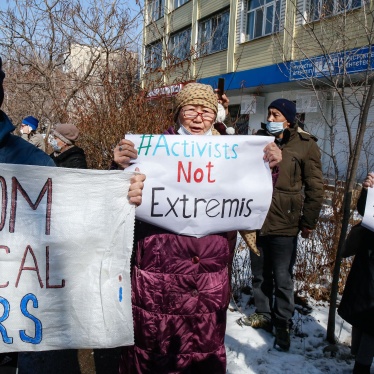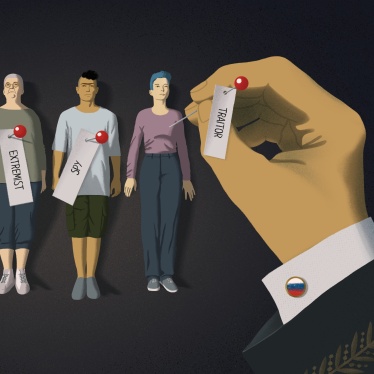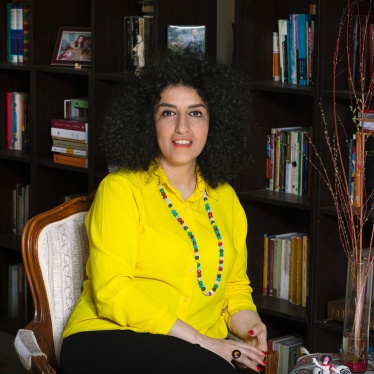The Presidential Administration of Ukraine blatantly violates freedom of expression through explicit instructions on how television stations may cover the news, Human Rights Watch said in a report released today that included examples of these directives.
The forty-eight page report, “Negotiating the News: Informal State Censorship of Ukrainian Television,” documents the impact of secret instructional memoranda, known as temniki (from the Russian phrase, temy nedeli [themes of the week]), on the practice of journalism in Ukraine. Prepared and distributed by the Presidential Administration to top managers and editors of national television stations, temniki delineate which news topics to cover and how to present them in broadcasts. Non-compliance invites a wide range of informal sanctions, including tax audits, license cancellation, arbitrary libel suits, demotions, and pay cuts.
“The Presidential Administration’s directives are an insidious form of censorship,” said Elizabeth Andersen, executive director of Human Rights Watch’s Europe and Central Asia Division. “Millions of viewers in Ukraine fail to receive important information about political, economic, and social developments,” said Andersen.
The report comes on the eve of the 2003 European Union-Ukraine Cooperation Council meeting, one of the most important annual gatherings between Ukraine and Europe.
Temniki have a strong coercive impact on news reporting in Ukraine. One pro-presidential perspective dominates television news broadcasts, the most widely used source of news in Ukraine. The activities and platforms of other political figures are distorted or ignored. The clearest example of this occurred during coverage of the September 16, 2002 opposition demonstrations, when stations aired strikingly similar reports and footage that failed to explain who was demonstrating, what their demands were, and the course the demonstrations took.
Threats of legal and administrative repercussions for non-compliance compel editors and journalists to fulfill the Presidential Administration’s guidelines. Even before the appearance of temniki, media outlets that supported opposition parties or failed to comply with official requests faced court challenges, arbitrary administrative inspections, and license withdrawals. Journalists have been demoted, dismissed, had their wages cut, and faced other negative consequences. While some journalists have quit their jobs to protest growing censorship, many continue to practice their profession under trying circumstances, resorting to self-censorship or reporting impartial news despite constant risks.
“Since the end of Soviet censorship, a certain degree of media pluralism has emerged in Ukraine,” said Andersen. “However, truly independent media outlets are quite rare.”
Economic instability has forced the majority of media to accept sponsorship and security from major industrial groups who have formed political parties and purchased media outlets. These patrons often use their media holdings as a mouthpiece for personal or group interests and opinions. Financial-political groups close to President Kuchma now dominate the six national television stations, and this, combined with the appearance of the temniki, has further eroded editorial and journalistic pluralism.
Informal censorship and economic dependence are not the only threats to media freedom in Ukraine. The “disappearance” and murder of oppositional journalist Heorhii Gongadze in September 2000 stirred domestic and international outcry over the threatening climate for journalists. The Gongadze case and other cases like it continue to remain unsolved. Kuchma and other prominent public officials have been implicated in the Gongazde murder, based on tape recordings of a meeting at which the president allegedly asked security officials to “take care” of the journalist.
To address the deteriorating media situation in Ukraine, Human Rights Watch called on the Ukrainian government to:
- End immediately the distribution of temniki or any other form of coercive written or verbal instructions from the Presidential Administration to all media;
- Ensure that censorship by government authorities or private individuals in any form does not continue by enforcing existing laws and obligations that prohibit censorship;
- Conduct prompt and thorough investigations of government officials and others implicated in censorship or other abuses against members of the media and hold accountable those responsible;
- Consider introducing legislation to guarantee a realistic minimum wage for journalists and a regulatory framework to guarantee legal recourse for journalists facing retaliation in the form of salary cuts, demotions, or dismissal.
Human Rights Watch called on the European Union to make media freedom a top priority in its relations with Ukraine and to require demonstrable improvements in Ukraine’s human rights as part of continued engagement.
Human Rights Watch also urged the international community to promote media freedom in Ukraine, recommending that international organizations such as the Council of Europe and the Organization for Security and Cooperation in Europe continue to assist and monitor the Ukrainian government in securing freedom of expression.









